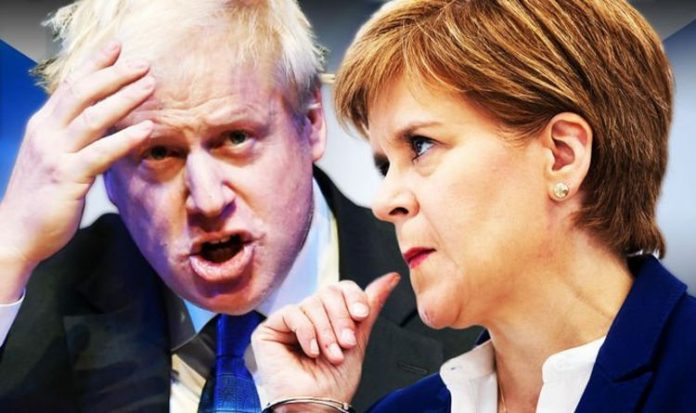As Prime Minister Boris Johnson won an 80-seat majority in December’s general election, the SNP enjoyed their own success in Scotland.First Minister Nicola Sturgeon argues that she now has a mandate to push for a second independence referendum.But Mr Johnson denied this request – provoking Scottish nationalists to seek a transfer of power from Westminster to enable the SNP to call a new vote on independence.After the election, Ms Sturgeon formally requested powers from Westminster to hold a second independence referendum – but the notion was firmly rejected by the Prime Minister.
The SNP opted for the section 30 order route – aiming to give Scotland the power to pass laws in areas that are normally reserved to Westminster.
The case is before the Court of Session at the moment where independence supporters are trying to establish whether Holyrood can legislate for a referendum unilaterally.
However, expert on public law Aileen McHarg highlights the barriers that the SNP could face if it decides to push for independence without Westminster’s approval.
In her paper published in January, she states that “achieving effective independence is a matter of securing recognition by other sovereign states, including the parent state, and this, as the ICJ (International Court of Justice) pointed out, is essentially a political rather than a legal matter”.
She adds: “In effect, international recognition is much more likely to be forthcoming if the independence process is perceived to have been legitimate.”
In an interview with Express.co.uk, Professor McHarg explained further why unilaterally declaring independence could backfire.
She said: “Unilaterally declaring independence is less desirable because while the action is lawful, the key point is effectiveness.
“Effectiveness really depends on whether other states recognise you. If other states don’t regard the process you’ve used to secure independence as legitimate then they may well not recognise.
“Given that becoming independent is a difficult process, to do an action like that where the UK government refuses to recognise it will be even more difficult.”
Prof McHarg highlights the recent example of Catalonia – the region which sought independence from Spain.
In October 2017, the region’s government held an unconstitutional referendum without permission from Madrid.
READ MORE: Nicola Sturgeon given green light for Scotland to join EU
Prof McHarg also said Ms Sturgeon could not take this route if she wants to achieve her goal of getting Scotland back into the EU.
She said: “Given that the Scottish government wants to go back into the EU, that is another constraint.
“There’s very little chance Scotland would achieve that in those sort of circumstances.”
However, Prof McHarg noted that while there may be political barriers to joining the bloc, the legal path is clear.
She continued: “Any barriers for Scotland in joining the EU are political rather than legal, because any candidate to join the EU has to abide by the terms set.
“It would be fairly easy to meet those terms because Scottish law is currently fully compliant with EU law.
“As time goes on there are likely to become greater divergences, but that would simply mean at the time Scotland wanted to join the EU we’d have to change stuff then.”







